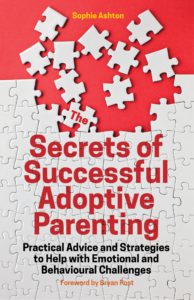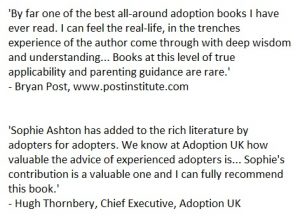 Sophie Ashton, author of The Secrets of Successful Adoptive Parenting, describes the emotional struggle she went through soon after her daughter moved in. Admitting that she did not anticipate the emotional toll it would take on her and her husband, she nonetheless says that adoption can be a wholly rewarding experience that brings joy, hope and fulfillment.
Sophie Ashton, author of The Secrets of Successful Adoptive Parenting, describes the emotional struggle she went through soon after her daughter moved in. Admitting that she did not anticipate the emotional toll it would take on her and her husband, she nonetheless says that adoption can be a wholly rewarding experience that brings joy, hope and fulfillment.
Everyone’s adoption story is unique and special to them. Yet many include the similar frustrations associated with the adoption approval and matching process and/or the emotional anguish associated with the loneliness and heartache of infertility.
Our story is but one of many, and one with which many people will identify. Getting through the adoption approval process took my husband and I two years, followed by 13 months to find our daughter and a further 10 months of waiting for the matching panel to approve us as her parents. As you can imagine there were many frustrations along the way. On the plus side, by the time Lucy moved in we’d had many years to read adoption related books, attend courses and prepare for her arrival. We were super excited and felt more than ready to welcome Lucy as our new daughter into our home.
In reality, however, we didn’t know what we didn’t know – how could we? We’d never adopted before. The social workers didn’t know what they didn’t know – how could they – they’d never adopted before, and despite all their wisdom and insights, which were certainly useful and helped us prepare in many ways, they had never parented an adopted child 24 hours a day, 7 days a week. They didn’t have first-hand experience of the emotional toll on the parents that can result after a child is placed.
Consequently, unbeknown to us there was a gap in our expectation. We were ready to handle challenging behaviour, to help our daughter process her emotions and heal her from the hurt she had endured and settle into our family. But we weren’t expecting the challenging emotions that that we ourselves experienced, that seemed to come from nowhere, in waves, in response to our daughter’s behaviours.
Soon after Lucy moved in we started questioning our decision to adopt, asking ourselves “What have we done?”, “Can we cope?”, “Will I ever develop feelings of love for this little girl?”. Doubt started to creep in. Where before we had only been positive we started thinking, “We’re not sure we are the right parents for this child” and even “We think she’d be happier with her long-term foster carers”. These thoughts were very isolating. Having gone to such lengths to pass through the adoption approval process, it was hard to admit to ourselves – let alone others – that we were struggling.
Once we realised that we were in the grip of negative emotions we consciously developed strategies to get ourselves out of the negativity; we reminded ourselves of our motivations to adopt and made ourselves take on a more positive and compassionate mindset. It was hard but it worked. This approach slowly changed our whole experience and allowed us to connect with our daughter and parent in the way that she so desperately needed.
In speaking with other adoptive parents, I soon came to realise that we weren’t alone in our emotional reactions, and that many others felt the same overwhelming and debilitating feelings as we had done. Some, like us, worked through them, but others weren’t able to. They took the emotions as a sign that the adoption placement would never work and started the process that eventually led to the disruption of the placement. Others limped on, not enjoying their child but not wanting to disrupt the placement either.
Adopting a child will be harder than you think, and if you are emotionally unprepared it may be far more challenging than you expect. Forewarned is forearmed. It can be easier if you are aware that experiencing challenging emotions in response to your child can be part of the process. It will be easier if you have strategies in place to help your emotions settle which will enable you to practice the therapeutic based parenting that your child will need.
Many birth parents suffer ‘baby-blues’, or the more serious post-natal depression following the birth of their baby. Adopters are not immune to ‘post adoption blues’ or ‘post adoption depression’ – it’s a natural reaction to having your life turned upside down by a child that is not biologically yours!
For some adopters, the assimilation of their child into their family is easy and trouble free. For others, the reality is very different. In most cases adoption does not involve a baby – it involves a fully functioning child complete with behaviours, attitudes and habits which will all be unfamiliar to you – and in many cases this can be way more challenging than a baby.
When the excitement of your child moving in wears off, the reality of what you have taken on may be a shock to your system – even if you think you were prepared. You may have spent years surrounded by social workers, foster carers, supportive family members and friends being upbeat, motivated and full of hope for the future. It may come as a surprise that when your child moves in, the rest of the world may seem just to get on with their life and to leave you to yours with the good intention of letting you bond with your child and beginning the first few weeks of the rest of your lives. Being left alone with your emotions however, while trying to get to know and bond with your child, can be hard.
In discussions with social workers, child psychologists and other professionals I was encouraged to compile my experiences into a book, The Secrets of Successful Adoptive Parenting. It discusses the natural, challenging emotions that parents may feel following the placement of a child, and suggests strategies to get through this tough period. Through speaking with other adopters about what worked for them, the book delivers a reassuring message that we are all in this together and that, with goodwill and strong patience, adoption can be a wholly rewarding experience that brings joy, hope and fulfillment.
I want to help adoptive parents better anticipate the reality of adoption and to prepare them with strategies they can use to manage their own emotions while implementing simple techniques that  demystify therapeutic parenting.
demystify therapeutic parenting.
This book will help all new adopters and their support network better appreciate the emotional side of the miracle that is adoption. It will give them the confidence to push forward with helping their child to become a part of their family.
I have never written a book before, but I felt compelled to write this one. I was delighted when JKP wanted to publish it and am delighted to know that it is already helping people.
Sophie Ashton is a mother of two wonderful children, a birth son and an adopted daughter. Professionally she has spent 25 years working as a management consultant and an executive coach. Over the years she has also worked as a volunteer with disadvantaged children through schools and the criminal justice system. Click here to find out more about The Secrets of Successful Adoptive Parenting.
If you would like to read more articles like Sophie’s and hear the latest news and offers on our Adoption and/or Fostering books, why not join our mailing list? We can send information by email or post as you prefer, and please also tell us about your areas of interest so we can send the most relevant information. You can unsubscribe at any time.